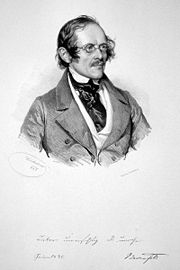
Eduard von Bauernfeld
Encyclopedia

Austria
Austria , officially the Republic of Austria , is a landlocked country of roughly 8.4 million people in Central Europe. It is bordered by the Czech Republic and Germany to the north, Slovakia and Hungary to the east, Slovenia and Italy to the south, and Switzerland and Liechtenstein to the...
n dramatist, was born at Vienna
Vienna
Vienna is the capital and largest city of the Republic of Austria and one of the nine states of Austria. Vienna is Austria's primary city, with a population of about 1.723 million , and is by far the largest city in Austria, as well as its cultural, economic, and political centre...
.
Having studied jurisprudence
Jurisprudence
Jurisprudence is the theory and philosophy of law. Scholars of jurisprudence, or legal theorists , hope to obtain a deeper understanding of the nature of law, of legal reasoning, legal systems and of legal institutions...
at the university of Vienna
University of Vienna
The University of Vienna is a public university located in Vienna, Austria. It was founded by Duke Rudolph IV in 1365 and is the oldest university in the German-speaking world...
, he entered the government service in a legal capacity, and after holding various minor offices was transferred in 1843 to a responsible post on the Lottery Commission. He had already embarked upon politics, and severely criticized the government in a pamphlet, Pie Desideria eines österreichischen Schriftstellers (1842); and in 1845 he made a journey to England
England
England is a country that is part of the United Kingdom. It shares land borders with Scotland to the north and Wales to the west; the Irish Sea is to the north west, the Celtic Sea to the south west, with the North Sea to the east and the English Channel to the south separating it from continental...
, after which his political opinions became more pronounced. After the Revolution, in 1848, he quit the government service in order to devote himself entirely to letters. He lived in Vienna until his death, and was ennobled for his work.
As a writer of comedies and farces, Bauernfeld takes high rank among the German playwrights of the century; his plots are clever, the situations witty and natural and the diction elegant. His earliest essays, the comedies Leichtsinn aus Liebe (1831); Des Liebes-Protokoll (1831) and Die ewige Liebe (1834); Burgerlich und Romantisch, (1835) enjoyed great popularity. Later he turned his attention to so-called Salonstücke (drawing-room pieces), notably Aus der Gesellschaft (1866); Moderne Jugend (1869), and Der Landfrieden (1869), in which he portrays in fresh, bright and happy sallies the social conditions of the capital in which he lived.
A complete edition of Bauernfeld's works, Gesammelte Schriften, appeared in 12 vols. (Vienna, 1871-1873); Dramatischer Nachlass, ed. by F. von Saar (1893); selected works, ed. by E. Homer (4 vols., 1905). See A. Stern, Bauernfeld, Ein Dichterporträt (1890), Rudolf von Gottschall, "E. von Bauernfeld" (in Unsere Zeit, 1890), and E. Homer, Bauernfeld (1900).
He also used the pseudonym
Pseudonym
A pseudonym is a name that a person assumes for a particular purpose and that differs from his or her original orthonym...
s "Rusticocampus" or "Feld".

